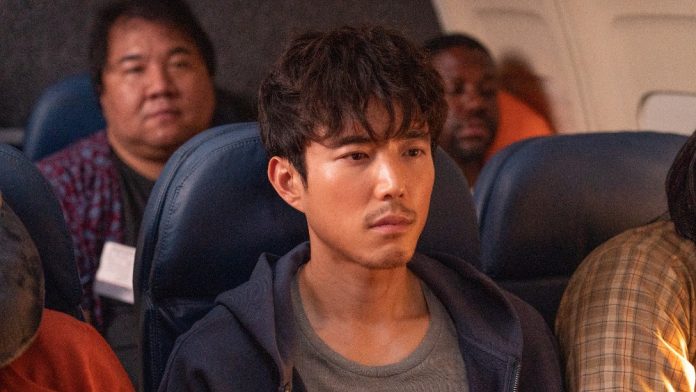There’s a long-standing tradition of Hollywood actors turning their interests toward directing, some of them quite successfully, actually. Oscar winners Clint Eastwood, George Clooney, and Ben Affleck have all thrived while wearing multiple hats on set. Based on the number of movies directed by actors at the most recent Tribeca Festival and the upcoming Toronto International Film Festival, this is something that’s becoming more and more common.
Actor Randall Park‘s feature directorial debut, Shortcomings, premiered back in January at Sundance, where it was picked up for distribution by Sony Pictures Classics. Based on Adrian Tomine‘s serialized comic story from Optic Nerve, the film stars Justin H. Min (Beef) as Bay Area indie filmmaker Ben Tanaka, whose long-time girlfriend Miko (Ally Maki from The Big Door Prize) moves to New York for an internship, putting a strain on their relationship.
Best known for his starring turn on the ABC sitcom Fresh Off the Boat and his recurring role on HBO’s Veep, Park has become beloved by comedy fans, though Shortcomings is less a straight comedy than a film in the vein of Ghost World, which makes sense considering the influence Dan Clowes must have had on Tomine. The seriocomic film is still very funny thanks to scene-stealer Sherry Cola (Joy Ride) and Park’s longtime friend Timothy Simons (also from Veep), who each play key roles.
Above the Line hopped on Zoom with Park a few months back for the following chat about his casting process on Shortcomings and why he felt it was the right time to make his feature directorial debut.
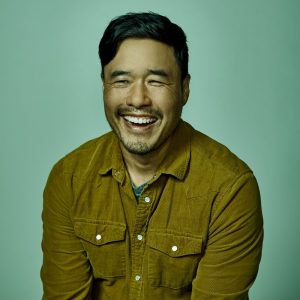
Above the Line: I’ve been a fan of yours from way before Fresh Off the Boat, and I’ve also been a fan of Adrian Tomine’s Optic Nerve, so I was excited you chose it for your feature directorial debut. What was behind that decision, and why was the time right for you to step behind the camera? Had you directed episodes of Fresh off the Boat?
Randall Park: Yeah, I’ve directed some TV. I did the finale of Fresh Off the Boat and some other things. I’ve done a lot of shorts and web stuff, but this is my first feature. I think it was always in the cards for me to try my hand at directing a feature. I didn’t know that it would be this particular story, but as soon as I found out that this story was available and that Adrian had written a script, and that the script was amazing, I felt like I had to throw my hat in the ring because the graphic novel meant so much to me. In a way, I had been envisioning it as a movie ever since I read it back in 2007. It was something I was very passionate about, so when I made the pitch for myself as a director, I almost felt like I had a head start because it was something on my mind for so many years.
ATL: When you got involved, had Jacques Audiard already done his French adaptation of some of Adrian’s comics? [It was a 2021 movie called Paris, 13th District] Did you know about that?
Park: Yes, I did know about [that]. I believe that while we were in pre-production or before pre-production, that movie came out.
ATL: It’s such a different thing, setting the stories in France, so did you actually read Shortcomings in Optic Nerve, or when it was collected?
Park: I read it in book form, but after reading that book, I searched for everything Adrian Tomine-related and have since been just a huge fan of pretty much all of his work. He’s just so brilliant.
ATL: I’m not sure if people who see this are going to even know that he’s related to the whole Dan Clowes/Peter Bagge indie scene, even though Optic Nerve came out later. Where was the script at that time? He did his own adaptation and probably expanded it a little bit for a movie, I would assume.
Park: He wrote a draft of the script shortly after the book came out, actually. He wrote a draft [and] he had some people that were interested in the movie at the time — this was around 2007-2008. According to Adrian, [he] was told by some studios that the movie wasn’t quote-unquote “castable,” so they asked him if he’d be open to a rewrite, basically rewriting some of these characters as ethnicities, which was something that he didn’t want to do. He kind of just put it away.
I think, over the years, there were some people that approached him to do something with the book, but things just… either he wouldn’t want to do it or the projects fell apart. By the time I came into the picture, the industry was very different. A lot of changes had happened in the past several years, and it became possible to tell a story like this. When I threw my hat in the ring and got on board, it was still a big fight to obtain financing and get people on board, but we somehow found the right team and were able to make it.
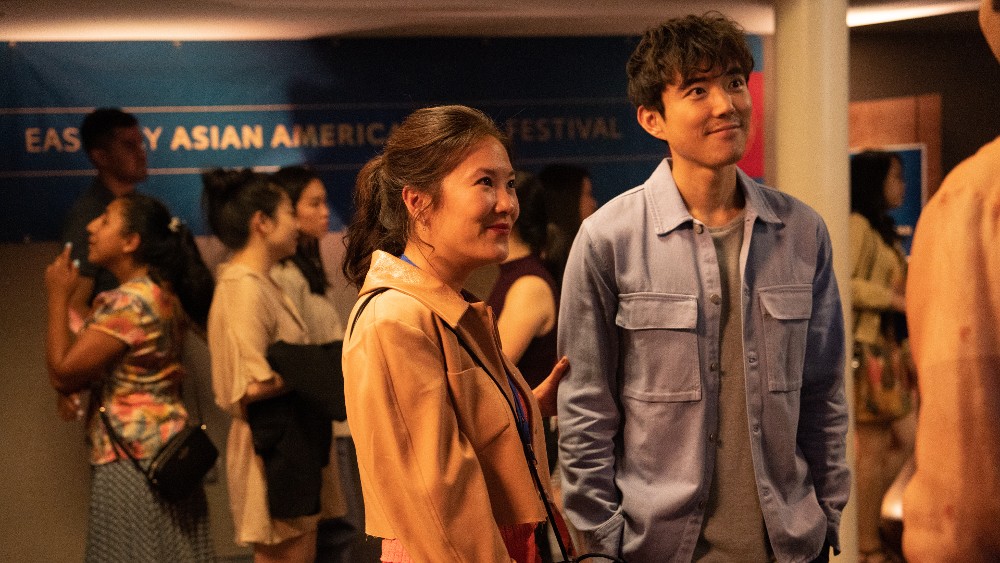
ATL: I have to ask… who came up with the knock on Crazy Rich Asians at the beginning? That obviously hadn’t come out when he wrote the graphic novel or the original script in 2007.
Park: No, no, there was a good two years where Adrian and I were talking through the script and doing a rewrite of it to modernize it. I think that was an idea I came up with, but not just that. There were a lot of small things to make it a little more modern, and then also, to rewrite to adapt to our smaller budget [and] make sure that we could shoot the film. But it was a good two years before we actually obtained financing to start production.
ATL: Was a lot of the Japanese-Korean dichotomy in the original comic? I don’t remember that from the comic, but it’s been a while since I read it. Especially the part with Ben meeting Alice’s parents.
Park: Yeah, I think it was. To be honest with you, I don’t fully remember. Right now, the book and the movie, in my head, they’re just so mixed up that I don’t fully remember if that was in there. I know that the church scene was in there, but it was very different from the novel. There were a lot of scenes that were changed for various reasons.
ATL: Let’s talk about casting Justin. I’m not sure what he had done when you cast him. Obviously, Beef hadn’t come out yet, but I assume Umbrella Academy was already going. What made you think of him for Ben?
Park: We saw a lot of actors, and every Asian-American actor who was kind of in that age range, almost all of them wanted to really play this part, because the role is so complex, and it’s a lead role. It’s just the kind of role that we don’t get to play that often. We saw a lot of really talented, amazing actors, and the thing that stood out about Justin was also kind of inherent in the challenge of the character, to begin with.
Here you have this very prickly, opinionated jerk of a character, and the big challenge was, “How do we make this character… not nice… but how do we get an audience to want to sit through an hour and a half with this character?”
For me, it was very much about making sure that we understood the vulnerability [of] the character, the reasons why he was this way, and to have an actor that could sensitively and in a nuanced way, show the layers of the character so that the angry tirade, yes, it’s fun [and] it’s funny, but to know that it comes from a real human place.
Justin is just such a thoughtful actor, and such a real craftsman at what he does. He came so ready and understood the character and the material and the tone of the movie, he understood it so deeply. So yeah, that’s why he got the part.
ATL: He’s also an Asian actor who, judging from his last name, you’re not really sure if he’s Chinese or Korean. And he seems to be deliberately vague about it, maybe because there’s this history of Japanese actors playing Chinese and vice versa, which is now changing. But were there any concerns about him playing a Japanese-American film director, since that’s such a large part of the story?
Park: Originally, it was very important for us to want to cast the characters accurately as they were written, but with the Ben character, the thought was a character like Miko, it felt a little more important that a Japanese-American actor play her, because her culture is such a part of the character, whereas Ben, if anything, he’s fighting against that.
I felt that we could be a little more open to… I mean, we did see a lot of Japanese-American actors, and a lot of them were great, but they just weren’t quite right for the role. Justin was really right for the role, and we found out later that he does have Japanese ancestry in him. We didn’t know that, but that’s cool to know.
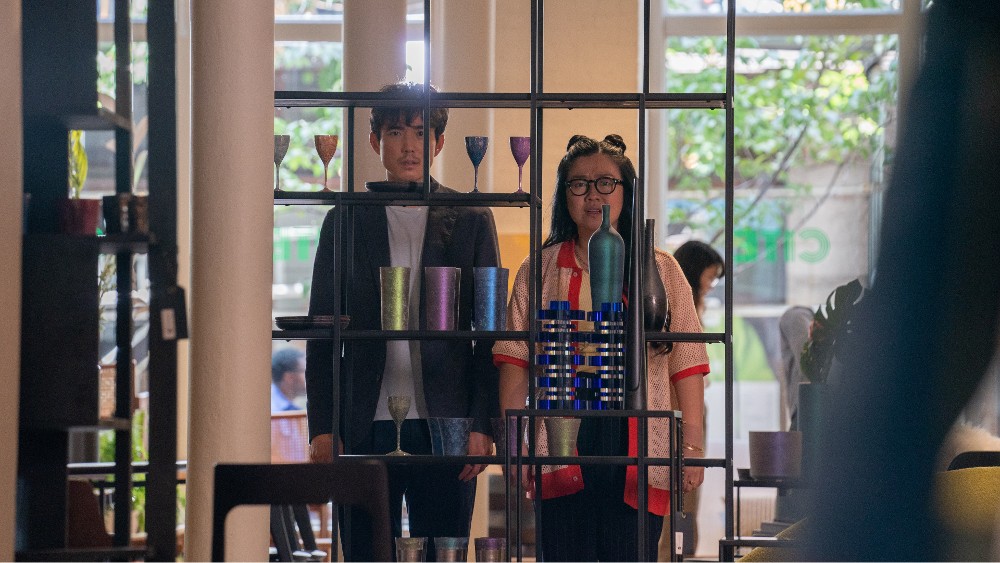
ATL: We also have to talk about the force that is Sherry Cola. Did you know her beforehand, and if not, how did you find her?
Park: I did. I’ve known Sherry for a long time, and she was somebody I had in mind for the role of Alice, even before I officially came on board. She’s always been a force, and [an] incredibly gifted actor, but also just [a] super funny, great improviser and someone who I always felt would make a great Alice. She still auditioned and she knocked it out of the park. When she did the chemistry read with Justin, they just connected so seamlessly and so easily; it was clear that she was our Alice.
ATL: I also liked that you got Timothy Simons in there in a very funny role after working together on Veep. It was a nice surprise when he showed up…
Park: I’ve known Tim since even before Veep. We worked on a commercial together, and we seemed to always be following each other throughout our acting journey. We always keep working with each other. He was also in The Interview and some other projects that I’ve done. When it came to casting Leon, I know Tim so well and know how amazing he is and how funny he would be, and he really does steal the show.
ATL: You shot this film in and around Berkeley and the Bay Area, so do you have a personal connection to those areas?
Park: I spend a lot of time there, just because I had friends who went to Berkeley. I went to UCLA, so I’ve been in L.A. all my life, but I have spent a lot of time in the Bay Area just through friends, and also through work. Always Be My Maybe, we shot that in Vancouver, but we shot a little bit of it in the Bay. I worked on Ant-Man and the Wasp, we shot that in San Francisco. I’ve always kind of kept coming back to San Francisco, so I know the Bay pretty well, and yeah, I love the Bay.
ATL: Now, is that an existing theater there, or was it something that was found or built?
Park: That theater is actually a real theater in New York. We shot a good percentage of the movie in New York, and then we shot a few days in the Bay. So a lot of exteriors are in the Bay, but the majority of our shooting was in New York, and that one location, we had to find it in New York. So we found, like, the most Bay Area-looking theater and street, I believe in Queens, and we shot there.
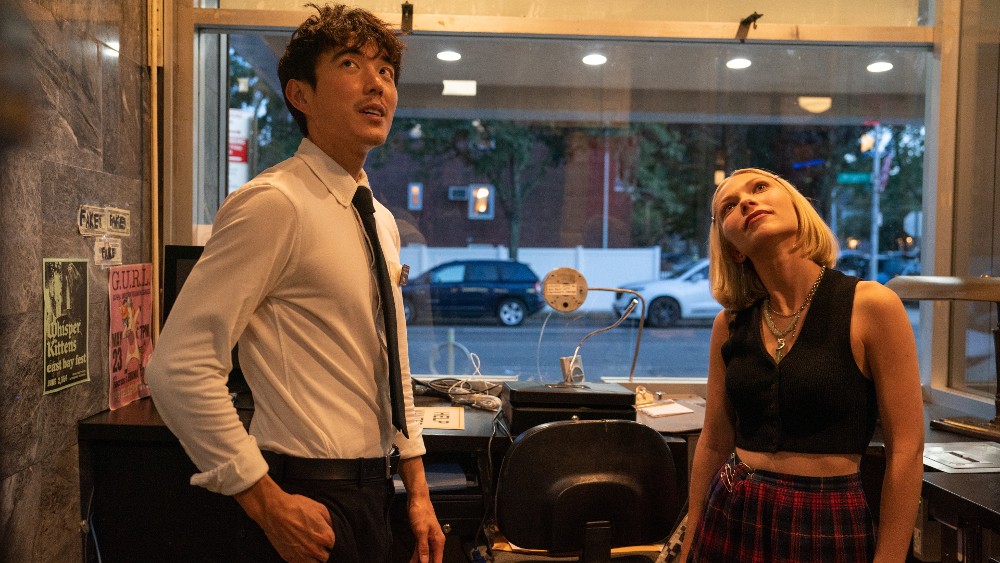
ATL: You really fooled me, because I feel like I’m very familiar with most of New York’s movie theaters.
Park: We had a great production designer. This guy Bill Boes, he ordered trash cans from the Bay, and we brought them here to New York, and we could use them in locations. Specific license plates on the cars and specific regional graffiti that we would put on walls. It was very detailed and well thought-out.
ATL: Before I let you go, have you ever read the graphic novel Eagle? When I first saw you on Veep, I immediately thought of Eagle, a Manga about the first Asian-American running for President — this is well before Andrew Yang — and you should definitely track it down. Maybe it’s something you’d be interested in, if not as an actor then as a director, or perhaps both?
Park: Wow. No, I am getting that immediately, definitely.
ATL: I also thought it was funny that I first became familiar with you from your single-scene appearances in various Apatow comedies. Sure enough, when you finally get the chance to make your own movie, you show up for just one scene. Did you always plan to take a small role, or did you cast yourself more out of necessity because you needed someone?
Park: It was a necessity, yeah, exactly. It was literally the morning of, or it might have been the night before, that whole scene was actually supposed to play out in another scene, but we were running out of time, so we couldn’t get the coverage on that scene. We tried to bring that actor to play the waiter, but the actor was unavailable the next day, so it was like, “Who is gonna do it?” It [fell] to me to do it.
Shortcomings opens in select theaters on Friday, Aug. 4, courtesy of Sony Pictures Classics.


